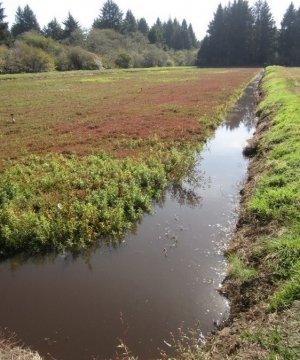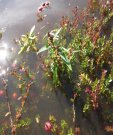Bog or Fen
Scenario model
Current ecosystem state
Select a state
Management practices/drivers
Select a transition or restoration pathway
- Transition T1 More details
- Transition T2 More details
-
No transition or restoration pathway between the selected states has been described
Target ecosystem state
Select a state
Submodel
Description
Structure: Hydrologically modified and cultivated cranberry bog
Transition state 2 represents a departure from the native plant community by the establishment and cultivation of cranberry (Vaccinium macrocarpon). The initial establishment of cranberry beds requires intensive management that includes clearing, leveling, and installing drainage systems, dikes, and irrigation systems. A monoculture crop is susceptible to a variety of insects, pathogens, and weedy plant species. Hydrologic changes from irrigation, drainage, erosion, and sedimentation impact the ecology of the site (Oregon State University Extension, 2002).
Mechanism
This pathway represents human-influenced hydrologic changes and cultivation of commercial cranberry bogs.
Model keys
Briefcase
Add ecological sites and Major Land Resource Areas to your briefcase by clicking on the briefcase (![]() ) icon wherever it occurs. Drag and drop items to reorder. Cookies are used to store briefcase items between browsing sessions. Because of this, the number of items that can be added to your briefcase is limited, and briefcase items added on one device and browser cannot be accessed from another device or browser. Users who do not wish to place cookies on their devices should not use the briefcase tool. Briefcase cookies serve no other purpose than described here and are deleted whenever browsing history is cleared.
) icon wherever it occurs. Drag and drop items to reorder. Cookies are used to store briefcase items between browsing sessions. Because of this, the number of items that can be added to your briefcase is limited, and briefcase items added on one device and browser cannot be accessed from another device or browser. Users who do not wish to place cookies on their devices should not use the briefcase tool. Briefcase cookies serve no other purpose than described here and are deleted whenever browsing history is cleared.
Ecological sites
Major Land Resource Areas
The Ecosystem Dynamics Interpretive Tool is an information system framework developed by the USDA-ARS Jornada Experimental Range, USDA Natural Resources Conservation Service, and New Mexico State University.



